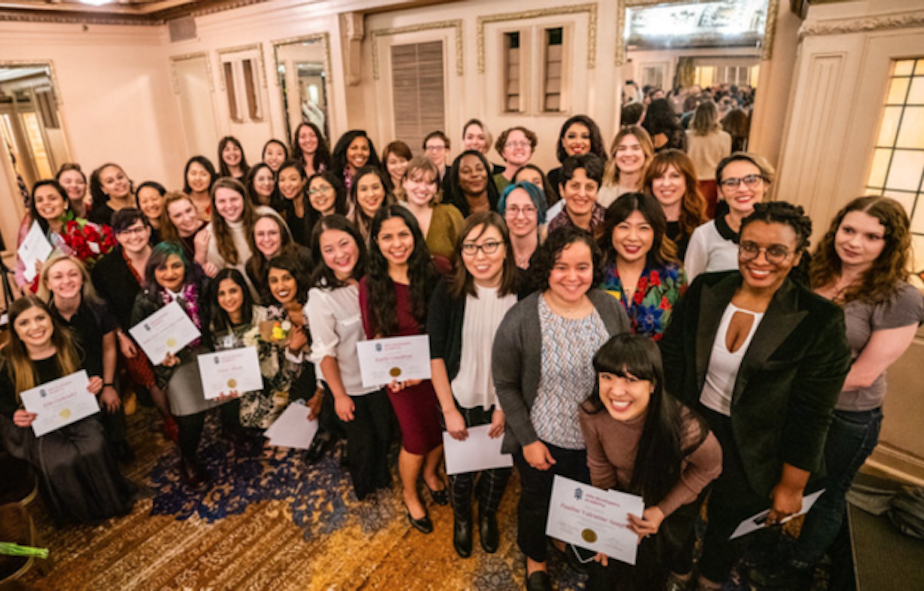This developers academy welcomes non-tech bros to the industry

In 2020, only about a quarter of professional computing jobs in the United States were held by women, according to the National Center for Women and Information Technology.
One Seattle group is trying to change that, and ensure women, people of color, and gender-diverse people are able to show up as themselves in this industry.
[RadioActive Youth Media is KUOW's radio journalism and audio storytelling program for young people. This episode was entirely youth-produced, from the interviewing and writing to the audio editing.]
This transcript has been edited for clarity.
Transcript
SORAYA MARASHI: The problem we’re talking about is the problem of feeling like you don’t belong, because you don’t see yourself represented in the industry.
Computer science has been a place of refuge for white dudes since its inception. They’re the ones who created it. You know, think Bill Gates.
Sponsored
And so we’ve always seen a significant underrepresentation of minorities, notably Black and brown women, as well as gender diverse folks. That means trans and non-binary people.
It’s not uncommon for people from marginalized groups to walk into a classroom and not see anyone who looks like them, says Dr. Amy Ko. She's a professor at the University of Washington Information School.
DR. AMY KO: And because of the heterogeneity of groups, in computer science classes, at any level in higher education, or even in K through 12. When you walk into that room, you’re aware that you’re different from other people.
MARASHI: And these students don’t know how welcoming those other people are going to be.
It just means that there’s really not any sense of belonging when you walk into that room. And that can quickly lead to you questioning if this field is really meant for you.
Sponsored
Ko says that she intentionally creates a safe space in her office for students to come and talk about these issues, and they do.
DR. KO: And so what I hear from them is that in a lot of ways, they don’t know how to thrive. They don’t know how to get support. They don’t know how to get help.
MARASHI: And she says that deters a lot of women from being part of computer science.
In 2013, there were a few career professionals in Seattle that saw this problem and decided to do something about it. Their solution was Ada Developers Academy, also known as Ada.
It’s a free, non-profit coding school for women and gender-expansive folks to gain a computer science education through in-class learning and an internship experience for students who are 21 and older. They learn full-stack development in languages like JavaScript and Python, and then pick a specialty of software development to pursue.
Here’s how the funding works: Ada usually has around 20 corporate partners per cohort. Companies like Zillow, Hulu, and Microsoft help pay for the academy because they know they need women of color and gender-expansive folks on their teams.
Sponsored
And these companies later hire “Adies” — that’s what they call students at the academy — to complete paid internships with them. Adies often go on to have full-time jobs with the companies they intern for.
Liz Rush is a former Adie and the current director of technology for the non-profit Seattle Against Slavery. She says that Ada helped her re-envision who a software engineer could be.
LIZ RUSH: When I hire for software engineers now, it’s like, I have a totally different picture of who could be successful in the role than what I thought before I went through the program.
MARASHI: For current Zillow engineer and former Adie Miriam Cortés, the program showed her the power of a supportive professional community. She says it’s like the expression “the rising tide raises all the boats.”
MIRIAM CORTÉS: The minute that you start realizing, 'Oh, we’re on a team, and yeah, that person might be better at x than I am, but I’m better at y, and together, we’re all learning and we’re all growing.' I don’t know that I’ve experienced that in a classroom of white dudes.
Sponsored
MARASHI: As more Adies enter higher-paying tech jobs, Ada’s CEO says the impact often ripples out as they invest their earnings into their families and communities by doing things like paying medical bills for family members or buying their first homes.
For RadioActive, I’m Soraya Marashi.
This RadioActive Youth Media podcast was produced in an advanced producers program for high school and college students. Production assistance by Kyle Norris. Prepared for the web by Mary Heisey. Edited by Kate Walters.
Find RadioActive on Facebook, Twitter, Instagram, TikTok, and on the RadioActive podcast.
Support for KUOW's RadioActive comes from the Bill & Melinda Gates Foundation Discovery Center.
Sponsored
If you have any feedback on this story, you can email RadioActive at radioactive@kuow.org or find RadioActive on Twitter @kuowradioactive. Or you can just click the feedback button on the right hand side of this page. Reach out. We're listening.



